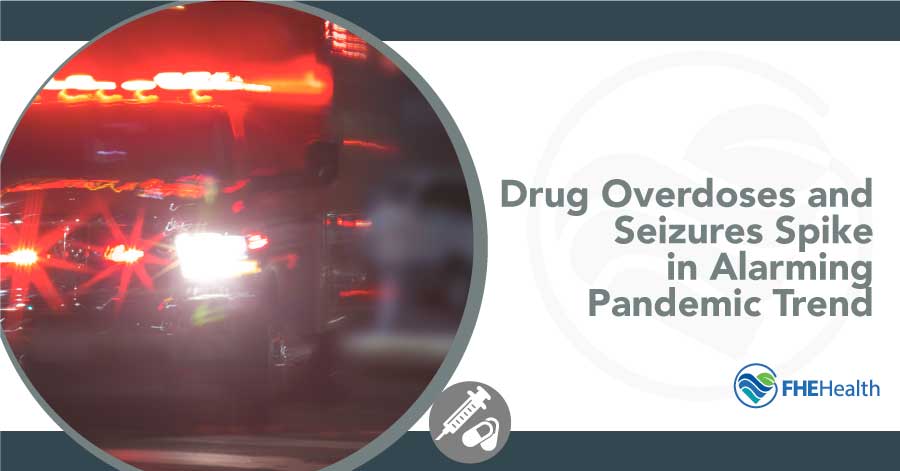
The COVID-19 pandemic has overshadowed virtually everything since throwing the world into chaos in early 2020. Employment, recreation, culture and medical practices changed overnight, resulting in a significant upheaval in the way the world works.
However, while the pandemic affected many other facets of how people live, the momentum of the opioid epidemic was largely unchanged. For those with an addiction to heroin or prescription painkillers, the pandemic did nothing to ameliorate the situation. In fact, evidence indicates the situation has worsened.
Unfortunately, fentanyl deaths didn't improve in 2020 versus 2019, regardless of the presence of the pandemic. In some areas, overdose deaths actually spiked, demonstrating the pervasive and serious nature of opioid addiction. Despite the endemic nature of COVID-19, the impact of the opioid crisis in 2020 and preceding years can't be overlooked.
Stress, Overdose and the COVID-19 Pandemic
COVID-19 effectively turned the world upside down. In a matter of days, states and cities issued mask mandates, ordered stores and restaurants to shutter, sent employees to work from home and changed life as we know it. Almost everyone saw a significant upheaval in their way of life, including changes in employment and lost jobs. Isolation and loneliness increased, activities required for mental health decreased and levels of chronic fear related to premature death rose.
The news in the early days of the pandemic was nothing short of terrifying. Doctors and nurses fought against an unknown assailant with no idea what to expect as the pandemic raged on. In some areas, like New York City, cases and deaths overwhelmed facilities. This painted a bleak picture of what the future could look like as the pandemic spread across the country. Given the situation, it's not surprising that stress levels and the use of unhealthy coping mechanisms soared.
Around 40% of American adults reported anxiety or depression stemming from COVID-19, in addition to effects such as trouble sleeping, loss of appetite and substance use. Alarmingly, 13% admitted to new or increased problems with substance abuse, indicating the use of drugs and alcohol as a way to manage pandemic stress.
Overdoses saw an increase in the early days of the pandemic as well. As people were faced with a rapidly changing world that appeared grimmer by the day, getting high became increasingly appealing. Based on rolling 30-day data, overdoses were up 18% in March, 29% in April and a further 42% in May. These overdose deaths in the earliest days of 2020 show clear evidence of a correlation between the pandemic and an increase in substance abuse.
The Growing Presence of Fentanyl
While medical professionals are hard at work fighting the pandemic, the drug trade is alive and well. Unfortunately, for those who have an opioid use disorder, this includes an ever-increasing presence of fentanyl.
Fentanyl, both in prescription forms and cut with heroin, has been an issue of particular note in the present opioid epidemic. The increased presence of fentanyl has accelerated overdoses and deaths across the country, and opioid crisis news indicates this trend shows no signs of stopping.
In many areas, seizures of fentanyl highlight that its use is still prevalent, in spite of the pandemic.
- In New York City, fentanyl seizures were up 59% over the prior year as of January 2021, and experts estimate over 60% of overdose deaths in the city involve fentanyl.
- Seizures are up at the Southern border between the United States and Mexico as well, with a 4,000% increase over the preceding three years.
- The Florida opioid crisis is also highly affected by the presence of fentanyl in illegally distributed drugs.
Overdose and a Stressed System
Few medical systems nationwide are unaffected by COVID-19. Unfortunately, this has caused something of a waterfall effect that's left everyone with fewer avenues for care.
With most medical resources, including hospital beds, EMS and available staff, allocated to COVID-19 patients, those with other health issues are suffering. EMS response times have increased dangerously, resulting in cases where help arrives, but not in time to make a difference. Furthermore, some hospitals have been forced to turn away patients due to a lack of space. All these factors are compounding the dangers of excessive opioid use.
Hospitals and urgent care aren't the only pain points in targeting opioid overdoses. According to Pfizer, manufacturing issues have contributed to lower supplies of Narcan, a critical drug in combating overdoses. Without rapid EMS response and easy access to Narcan, those struggling with opioid addiction are in greater danger than ever before.
The Problems With Self-Medication
Many people across all walks of life feel compelled to try to fix problems themselves before reaching out for help. In times of great stress, this can lead to abusive behaviors such as drinking too much or developing a drug habit. Users often assume these are short-term ways to handle stress, but it's far too easy for habits to form. This was evident in the opioid epidemic in 2020.
Admitting a need for help can be very difficult to do. However, it's the best way to overcome stress, anxiety, depression, or personal struggles without putting health or life in danger. Speaking to a professional, joining a support group or entering a treatment program can increase the likelihood of overcoming problems. Seeking help can also significantly reduce the risk of harm.
Getting Help for Addiction
Unfortunately, the challenges of the COVID-19 pandemic are ongoing. This makes life harder than ever for those struggling with an addiction to drugs or alcohol. However, the pandemic's presence shouldn't be a barrier to getting help. Rehabilitation resources are still available for those living with substance use disorders of all kinds.
If you or a loved one is living with addiction, contact FHE Health today by calling (833) 596-3502. We offer various treatment options to help prevent a repeat of the opioid crisis of 2020.






